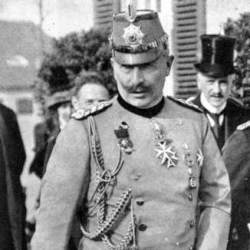
The Beginning
Europe, at the start of the twentieth century, was becoming an increasingly tumultuous place to live. Germany had developed into a powerful, industrialised and mechanised nation, with Kaiser Wilhelm II standing as a national figurehead of pride and ambition. Throughout most of his life, despite physical disabilities, he had longed for greatness and harboured hopes of emulating his British royal cousins. This was especially so, when it came to the ownership of a great and powerful navy. Therefore, when he came to power in 1888, Wilhelm quickly dismissed his Chancellor, Bismarck, and set out constructing a mighty military power.
Bismarck had kept peace in Germany for many years, by the careful construction of alliances and treaties, through which there had been an effective balancing of the powers in Europe. Wilhelm’s actions undid this, as his desire to build up powerful military forces alienated both Russia and Great Britain. France had regarded Germany as her natural enemy for many years and longed for revenge following her humiliating defeat in the Franco-Prussian war of 1870-71. Even the French civilians regarded Germany as a common enemy and all believed that one day they would recapture their surrendered territories of Alsace and Lorraine.
This situation left Germany feeling both surrounded and isolated at the same time, which in turn, encouraged the population of that country into feelings of nationalism, as they looked to the Kaiser to inspire the nation to greatness and superiority.
In the meantime, however, the whole of Europe also faced great social unrest. In Britain, Asquith’s government had to deal with uprisings as the Suffragettes were campaigning, sometimes violently, for the right to vote. Women came to regard themselves as being ‘tortured’ by men and some of the punishments meted out to Suffragettes would seem to bear this out. There was also great dissatisfaction relating to the problems regarding Home Rule in Ireland. Many European countries were also experiencing an increase in industrial disturbances. By 1914, for example, one million Frenchmen had joined trade unions and Socialists were speaking out against the amount of money which was being spent on the military, while the working classes lived in poverty.
In Russia, the ruling Romanov dynasty was facing great upheaval. Socialist revolutionaries were undermining and threatening the authority of the Tsar, Nicholas II, leading to the creation of a Parliament, the Duma, in 1905. This only partially quelled the revolutionaries, who still sought greater powers and radical reforms.
German workers, maybe, experienced some of the most considerable changes of all. Berlin grew to become a thriving, mechanised city. The workers, however, were extremely powerful and demanded a greater degree of equality with the ruling classes. This posed a great threat and Socialism was regarded with fear and distrust.
Austria-Hungary not only faced industrial unrest, but also had to contend with rising tensions between the various nationalities who lived within her boundaries, particularly the Serbs.
Many in Europe, therefore, saw the need for change and realised that it would take a tumultuous event or explosion to really bring that about. Only in this way, it was believed, could order be restored. Many of Europe’s leaders were, therefore, looking for an excuse to ‘light the touch paper – and stand well back’.